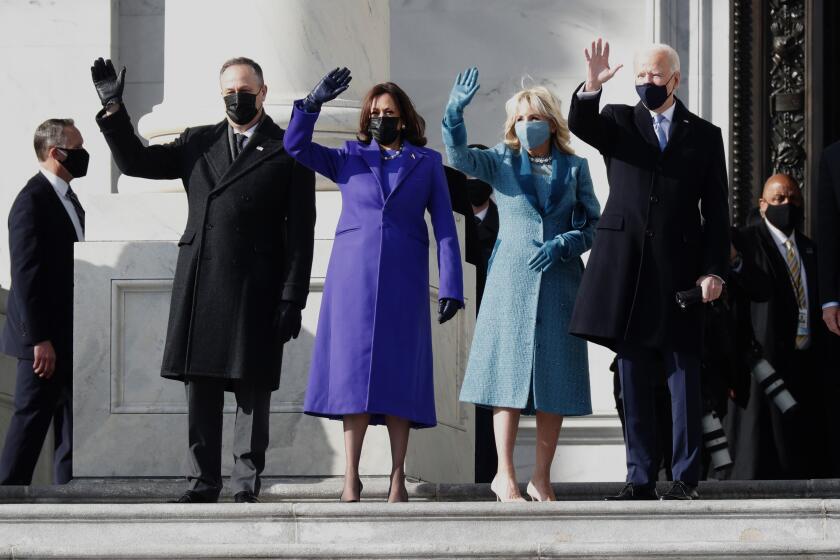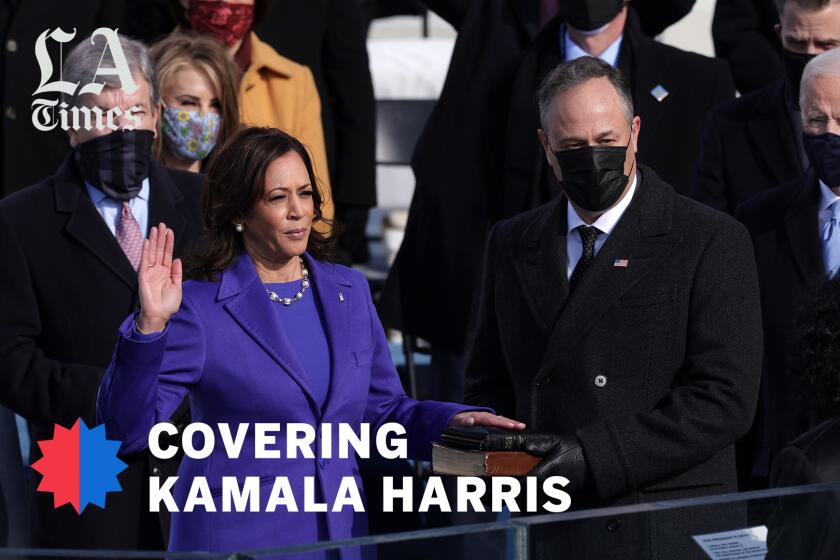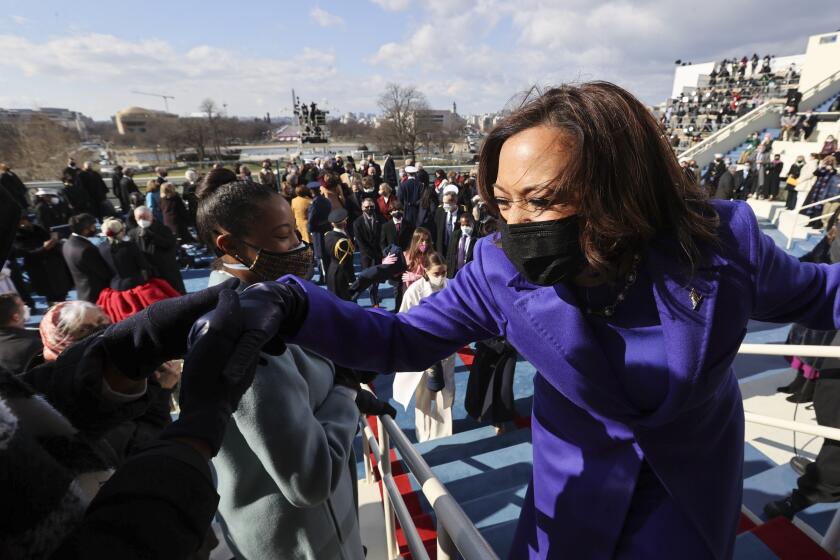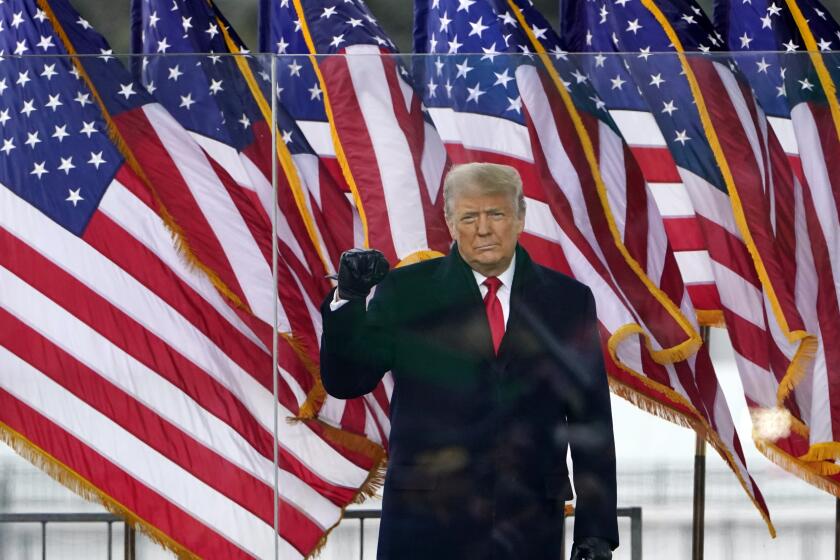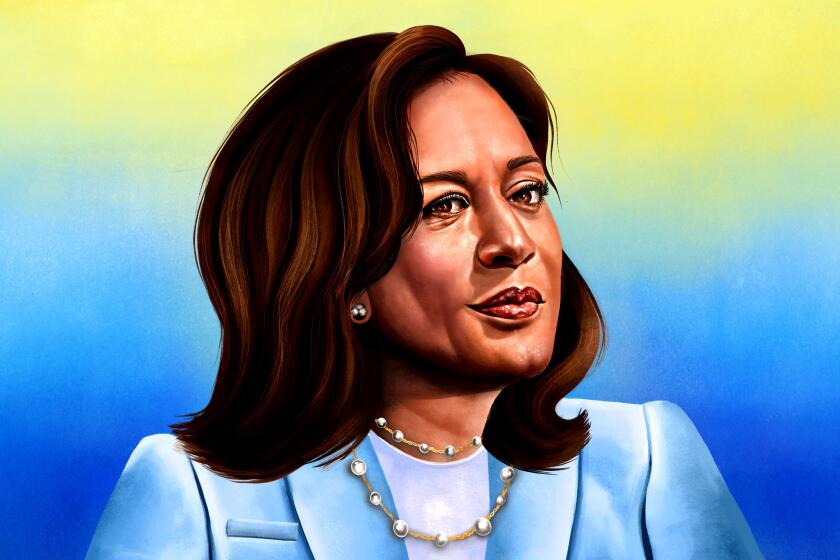Biden becomes the 46th president, vowing to heal and unite a nation in crisis

After a half century as senator and vice president, Joe Biden will assume the presidency at a time of health, economic and societal crises.
- Share via
WASHINGTON — Joseph Robinette Biden Jr. was inaugurated as the 46th president of the United States on Wednesday, assuming office amid several crises after routing a predecessor who fought to stay in power, and clearing the way for a beleaguered nation to turn the page on one of the most divisive chapters in its political history.
Before taking his oath on the Capitol’s West Front, Biden saw a historic barrier shattered as Kamala Harris, formerly a senator from California, was sworn in as the first woman, Black person and South Asian American to become vice president. Sonia Sotomayor, the first Latina Supreme Court justice, administered Harris’ oath.
In his inaugural address, Biden tried to rally the country to meet the historic challenges of COVID-19, a struggling economy, racial tensions and political divisions that have provoked violence and death.
“To overcome these challenges, to restore the soul and secure the future of America, requires so much more than words and requires the most elusive of all things in a democracy: unity,” the new Democratic president said.
Calling for unity is an inaugural staple, but Biden’s appeal resonated due to the country’s dire straits. He plainly was banking on Americans’ desire to transcend politics and find ways to quell extremists’ violence, control the pandemic, rebuild the economy and, even for some Republicans, put the Trump era behind them.
During today’s inauguration ceremony, Joe Biden became the 46th president of the United States.
Without ever naming former President Trump in his 21-minute address, Biden made pointed note of the lingering damage from his predecessor’s postelection campaign to stay in power, which tested the foundations of democracy — damage that was literally evident in places throughout the Capitol, which had been violently invaded just 14 days before by supporters of the outgoing Republican president.
“We have learned again that democracy is precious, democracy is fragile, and at this hour, democracy has prevailed,” the new president said.
Still, Biden’s message most likely fell flat among the many Republicans who, swayed by Trump’s false claims that the election was rigged against him, refuse to accept the legitimacy of Biden’s presidency.
“At this moment, we are a divided country,” said Rep. Lee Zeldin (R-N.Y.), one of those in Congress who backed Trump’s efforts to overturn the election result.
Biden’s address, while urging conciliation, was laden with stinging implied indictments of his predecessor’s legacy.
“We must reject the culture where facts themselves are manipulated, even manufactured,” he said, calling for a change of political culture, so that people could disagree without “this uncivil war that pits red against blue, rural versus urban, conservative versus liberal.”
“We can do this if we open our souls instead of hardening our hearts,” he went on, “if we show a little tolerance and humility, and if we’re willing to stand in the other person’s shoes.”
And Biden spoke directly to Trump’s supporters: “To all those who did not support us, let me say this: Hear me out, as we move forward. Take a measure of me and my heart.”
In a slap at Trump’s style of leadership, which was laser-focused on appealing to his political base, Biden said, “I pledge this to you: I will be a president for all Americans.”
Kamala Harris makes history as the first woman, Black person and Asian American vice president of the United States.
Congressional Republicans were complimentary of Biden’s address, but his words likely will fade once lawmakers turn their attention to policy details.
“It was a good speech, and I hope that, in terms of serving as president, he sticks with that,” said Sen. John Barrasso (R-Wyo.), who immediately raised concerns about an executive order Biden was about to sign canceling Trump’s approval of the Keystone XL pipeline. “It was a speech of unity, and it’s important to govern that way as well.”
Within hours of taking the oath, the new president signed that order and more, dramatizing the change in direction and reversing some of Trump’s most controversial federal policies. Biden issued executive orders on the environment, immigration and other issues, moving to rejoin the Paris climate agreement, rescind Trump’s order for the deportation of young immigrants known as Dreamers, reenter the World Health Organization and overhaul Trump’s restrictionist immigration policies.
Lingering partisan tensions were a subtext in a post-inaugural event inside the Capitol, where congressional leaders gave gifts to Biden and Harris.
“As leaders we are judged not by our words but by our actions,” said House Republican leader Kevin McCarthy of Bakersfield, who was one of Trump’s most loyal supporters and voted just after the Capitol siege to challenge Biden’s electoral college victory. “Let’s go forth from here together — accomplish great things.”
A few hours earlier, Trump had left Washington for Florida, making one last trip from Joint Base Andrews on Air Force One to West Palm Beach after a small farewell rally at the airport. In doing so, he broke one last norm — dispensing with the 152-year-old rituals of a peaceful transfer of power by declining to greet his successor at the White House and then attend the inauguration.
Addressing a smaller crowd than expected of family members, aides and supporters, Trump said, “This has been an incredible four years. We’ve accomplished so much together.”
“We will be back in some form,” Trump said in closing, seeming to hint as he has before of perhaps seeking the presidency again in 2024. Then, at 8:59 a.m., Air Force One lifted off.
Trump did adhere to one tradition: He left a note for his successor at the White House. Biden declined to divulge Trump’s message except to describe it as “very generous.”
Moments after the outgoing president and First Lady Melania Trump waved and disappeared into the plane to depart, the president-elect and wife Jill Biden went to the Cathedral of St. Matthew the Apostle for morning Mass, a reminder that for only the second time in history the nation has a Roman Catholic leader.
Kamala Harris was sworn in Wednesday as vice president — the first woman, first Black American and first Asian American in the position.
The church service allowed Biden to start his day with the show of bipartisanship that Trump denied him. Joining him at Mass were Congress’ top Republicans — McCarthy and Sen. Mitch McConnell of Kentucky, who declined to attend Trump’s sendoff, underscoring the isolation of the final days of his presidency.
Among the Republicans attending the inauguration ceremony was former House Speaker Paul D. Ryan of Wisconsin, who had often been at odds with Trump but rarely spoke up to criticize him.
“Our institutions were tested this year and our institutions passed the test. I’m here out of respect for the peaceful transfer of power and for the institutions,” Ryan said, adding, “Joe Biden is the legitimately elected president of the United States and I’m here to honor this process.”
Rarely has a new president had less need for an orientation to the White House: Biden, at 78 the oldest man to become president, brings to the job 44 years of governing experience as a senator and vice president. He has run for president three times in the last 33 years. Now he takes on the job of his dreams, but at a nightmarish time of health, economic and societal crises.
He took the oath with his hand on a family Bible that he used for swearing-in ceremonies as vice president and senator, an heirloom that has been in his family since 1893. The entire spectacle set a markedly different tone than the event four years ago, when Trump in his inaugural address evoked a dark vision of “American carnage” — a country racked by poverty, industrial decline, drugs and crime.
As he exits the White House President Trump is disrupting many of the most critical and cherished traditions of handing power from one president to another.
Biden’s view from the Capitol, looking across the National Mall to the Washington Monument, was devoid of the hundreds of thousands typically in attendance. The crowd limitations were not only a precaution against spreading the coronavirus that has led to more than 400,000 U.S. deaths, but also a safeguard against continued threats of violence by pro-Trump extremists.
An unprecedented deployment of military and law enforcement personnel stood guard, turning the area around the ceremonial site and the city beyond into a virtual armed encampment.
For the first time in history, the incoming president was joined on the inaugural platform by a vice president who is not a white man — a pivotal moment for a nation still struggling to end racial disparities. It was especially poignant for Black women who have been a vital if underappreciated force in the Democratic Party.
Introducing “Covering Kamala Harris,” a new political beat from the Los Angeles Times.
Rep. Barbara Lee (D-Oakland) said the ascension of her longtime friend Harris to national office was “just a remarkable historic moment for me.”
“Black women have fought so hard to elect other people, to be part of this Democratic Party, to get people out to vote,” Lee said. “We never would be here had it not been for the work and the struggle and the fights” of Black women.
The dignitaries in attendance included three former presidents — Barack Obama, George W. Bush and Bill Clinton — along with former Secretary of State Hillary Clinton, who lost the 2016 race to Trump. While Trump stayed away, his vice president, Mike Pence, showed up.
The ceremony, which began with a light snow falling, featured a lineup of celebrity performers, including Jennifer Lopez, Garth Brooks and Lady Gaga.
As Lady Gaga sang an unconventional rendition of the national anthem, the sun emerged, and it stayed out to shine as Biden spoke.
Yet reminders of the threat of violence were everywhere: Some House members wore body armor. Harris was escorted by Eugene Goodman, the Capitol Police officer newly famous after videos showed him defending the Senate on Jan. 6 as rioters swarmed after him.
“It’s on one hand heartbreaking,” said Rep. Dean Phillips (D-Minn.), “and on the other a very poignant reminder of the fragility of democracy.”
Times staff writers Eli Stokols and Sarah D. Wire contributed to this report.
